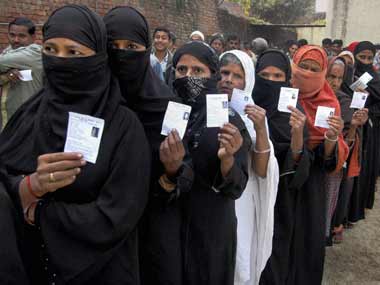
Manipur is a microcosm of India, inhabited by numerous ethnic communities professing various religions. Hinduism is the majority religion in the state followed by Christianity and Islam which forms the third largest religious community constituting 8.4 percent of the total population in Manipur.
Even though Hindus are in majority, Indian politicians never dare to ignore minority issues during the time of elections. Then, how can political parties afford to ignore Muslim population as their vote can swing election results in more than a dozen assembly constituencies in Manipur. It is against this backdrop, inclination of the Muslim voters becomes a crucial factor in the upcoming Manipur Assembly election 2017.
Muslim community of Manipur is locally known as ‘Pangal’ or ‘Meitei Pangal’. In terms of origin and common ethnic attributes, Meitei Pangals are product of amalgamation between Muslims and indigenous Meiteis.
At present, according to estimates more than 2 lakh Meitei Pangals form a large portion of the Muslim population in Manipur. Starting from the initial stage of democratisation, Meitei Pangals have been actively involved in political activities in Manipur. Since 1606 AD, when they started actual settlement in Manipur, Meitei monarchs appointed many Meitei Pangals in key administrative posts.
Even the then ‘Manipur State Constitution Act 1947’ reserved three seats for Muslims in the state assembly assuring their adequate representation. Meitei Pangals have so far produced prominent political leaders including the first chief minister of Manipur after statehood.
When it comes to political inclination, Meitei Pangals do not have a single party alliance. In the last ten general elections, on an average 3.5 Meitei Pangal MLAs represented the community in 60-member house.
Sometime, representation of Meitei Pangal increased as much as 7 MLAs in the second Manipur Legislative Assembly (1974-1979) but it decreased to as low as only one in the seventh state assembly.
Results of previous elections confirm that Indian National Congress (INC) and Manipur People’s Party (MPP) were the most popular political parties among the Muslim voters.
The Congress government in December 2006 announced 4 percent reservation policy for the Meitei Pangals in state job reservations and others, and it partially addressed the aspirations of the Muslim community, but only one INC Muslim candidate managed to win from Keirao constituency in 2007 general election. In the 10th State Legislative Assembly (2012-2017), Congress party fielded 6 Meitei Pangals out of which three won but BJP gave ticket to only one Meitei Pangal candidate in Mayang Imphal constituency, who eventually lost.
With the advent of BJP-led NDA government at the Centre, a new political wave entered Manipur. Renewed BJP wave in Indian politics found supporters from all sections of Manipuri society including Meitei Pangal community. In 2014, many prominent Meitei Pangal CSOs criticized the incumbent ruling Congress government for not implementing the prime minister’s new 15-point flagship programme. They blamed successive state governments for the persisting pathetic condition of the community.
During the ILP movement, particularly in 2015 and 2016, Meitei Pangals felt ignored as they feel that the contentious bill passed by the state government defining the ‘original’ settlers of Manipur do not clearly define their case. Recently, Muslims in some villages and towns organised protests and sought slogans against the state government for its tardy reaction towards some mob violence inflicted upon them by the majority community. All this and other factors garnered the recent Muslim disenchantment of the Congress government in Manipur.
On the contrary, for the ensuing election more than 17 Meitei Pangals emerged as intending BJP candidates. Even though BJP is yet to come up with the second list of candidates for the remaining 29 constituencies, at the most, Meitei Pangal might get another ticket at maximum as BJP disappointed them even in most of the Muslim stronghold constituencies in the first list of 31 BJP candidates announced on 23 January 2017. For the Congress, they are likely to continue their previous strategy of giving half a dozen tickets to Meitei Pangals. Congress shall be fielding three to six Meitei Pangal candidates.
In the upcoming election, not only the major national political parties, the newly formed PRJA (People’s Resurgence and Justice Alliance) of Irom Sharmila is also giving party tickets to Meitei Pangals. PRJA is floating the first Meitei Pangal women candidate. Representation of Meitei Pangal MLAs in the 60 member state Assembly has always been there.
However, this time Meitei Pangals are demanding the opportunity for the representative representation of Meitei Pangals in the State Assembly corresponding to their population share which is in tune with provisions in the then ‘Manipur State Constitution Act 1947’. As against the demand for minimum three tickets, BJP has so far given ticket to only one Meitei Pangal. This may again change the equation between BJP and Meitei Pangal because it does not fulfill the raising aspirations of Meitei Pangals towards BJP as a new political force in Manipur.
Changing equation of Meitei Pangal with BJP presented another twist when some of Meitei Pangal intending candidates were not given tickets. These left out and dejected Meitei Pangals who were once BJP ticket intending candidates, reiterated BJP as ‘anti-Muslim’ party and some of them have already deserted the party. Thus, due to a few years of BJP in power in the centre, the dynamics of Meitei Pangal politics in Manipur has shown some dramatic changes in light of the ensuing general elections to the Legislative Assembly scheduled on 4 and 8 March this year. Even if the focus may be on ‘Hindu and tribal votes’, BJP must not ignore the demand for proportional representation of Meitei Pangals if it wants to build a secular image among the Muslim electorates of Manipur.
Yumlembam Khogen Singh teaches at the Department of Sociology, Manipur University as an Assistant Professor.
Source: Firstpost



